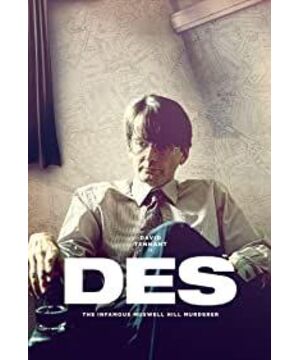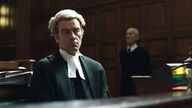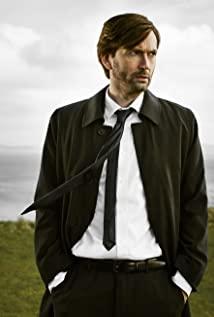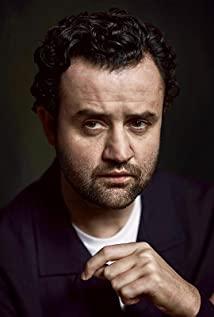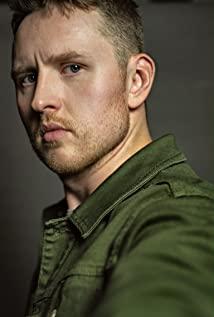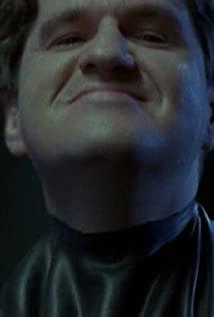This article was first published on the WeChat public account of Universal Screen~! Follow and it's over. Hey!
A middle-aged Scottish man with an ordinary appearance, wearing a pair of large-frame glasses that is a little old-fashioned, but fits his status as a small civil servant.
When his thin figure passes by you, it will never attract your attention. He looks too ordinary. He is low-key, humble, friendly, and even a little British when he gets along with people. little humor.
A notorious serial murderer of the last century, who killed 15 men between 1978 and 1983, stored and manipulated the remains of his victims at will, in order to make room, he used extremely cruel methods to divide the bodies, Destroy the corpse.
Unbelievable though, as those who knew the killer at the time of the crime were astonished, the above two descriptions are of the same person - Dennis Andrew Nilsen
The drama I am going to show you today is about his story——
"Dance"
This British ITV TV series is short and powerful. The whole story has only three episodes. Once it was broadcast, it gained a good reputation.
The series is based on Brian Masters' book "Murdering," along with some research on Dennis, as well as the murderer's personal account.
The material that can support the script is quite rich, but the compact narrative of "Dance" does not serve a more general routine.
The show skips straight to all crime, the end is the beginning, and the real horror of Dennis begins.
Detective Chief Inspector Peter Jay (Daniel Mays) of the Metropolitan Police Division receives a report early in the morning that a plumber claims to have found human remains in the sewers of 23 Cranly Gardens, Maxwell Hill.
Tenant Dennis Nelson (David Tennant) is the biggest suspect.
Peter and the inspector Steve, who came with him, waited until Dennis came home from get off work. The moment they entered the house, an unbearable stench hit his face, and Peter immediately decided that Dennis was the culprit.
No one expected that after Peter's first question, Dennis confessed to the crime and pointed out the hiding place in the house without reservation.
Everything went smoothly and abnormally, and the most uncomfortable thing was Dennis's attitude. There was no panic or any bad lies. It was full of ease and calmness.
When he got into the police car and faced the question of "Is there one body or two?" Dennis said in the most absent-minded tone you can imagine, "Fifteen or sixteen."
In just a few minutes, his composure has become out of tune with everything on the screen, which makes every audience sigh in their hearts: "There is absolutely nothing wrong with him".
At the beginning I said that "Dance" is "his" story is not entirely accurate, at least not in line with the traditional practice of this type of film and television adaptation.
The series not only avoids all irritating and bloody scenes (the most important one is the passing of the victim's hands), but also avoids intuitive reproduction of all the living conditions of Dennis before his arrest.
From arrest, to confirming the identity of the victim, and finally to the court trial that has attracted much attention, these constitute the main line of "Dance".
If you don't know the real case behind the show in advance, then "Dance" will definitely provide you with a sufficiently intense viewing experience.
The suspense that kept surging up until the last moment gave people a chance to breathe a sigh of relief.
The calm state of Dennis after his arrest always reveals an unusual sense of oppression. The intuitive portrayal of him in the series comes from his conversations with the police, biographers and others.
Without exposed brutality and madness, or obvious psychological trauma, he talked about his crimes in a detached state, and even drove away his defense lawyer for "justice".
David Tennant contributed a very convincing performance, not only the appearance is highly restored, but also the chilling aura of his gestures also left a deep impression.
The whole drama can't find a so-called "acting moment", and all the shocks are staged under the calm surface.
When the character of Dennis overthrew the audience's existing perception of him time and time again, his eyes seemed to be able to push people into the endless abyss, freezing to the bone. (No wonder some fans called it "reincarnation acting")
The episodes are framed in time so that the narrative ambition of "Dance" is positioned to present as complete a social dimension as possible.
Before Danse quickly got to the point, it first appeared in London in the early 1980s.
The economy was depressed, unemployment soared, and social unrest was unrest.
The hopeful "Lun Piao" experienced painful disillusionment, and the social picture that swept their eyes succinctly and efficiently pointed out the social environment in which Dennis lived.
Most of the victims of the case were young men who lived unhappily during this period. The poor social environment and lack of resettlement measures created a large number of homeless homeless people and drug addicts.
Mixed in the edge and bottom of society, they are in a cold world without the slightest warmth.
And "warmth" has thus become the "bait" that Dennis has tried and tested, and the sudden kindness and concern lured the victims into the death trap.
Ironically, these victims share one characteristic with their perpetrators, namely "lack of companionship".
It is precisely because of the desire for permanent companionship that the best and worst sides of human nature are twisted together.
As bewildered by survivor Carl, who testified in court, he didn't even know if Dennis was his "murderer" or "redeemer".
We certainly don't have to put a connection between the murderer and the social environment ahead of his personal misdeeds, but it's an angle worth considering.
Just as Wen Ziren in "The Conjuring 2" integrated the real plight of the British bottom into the haunting incident in Enfield, the multi-dimensional portrayal in "Dance" actually enriches the core characters in the play.
Dennis, who is in the center of the vortex, has an extremely clear cognition, analyzes himself, examines the society, pursues justice and absolute truth, understands his "evil" without the slightest guilt, and does not need any forgiveness.
He is as calm as an observer of the human moral system, but he himself stands outside the system, and this is not mixed with any extreme thinking similar to a cult, which is contradictory and elusive.
Using the relatively clean relationships of the "Lun Piao" to avoid the attention of the police and continue to commit crimes in the residence makes Dennis a bit like another version of the "White City Devil" Holmes.
But from the "elusive" feature, Dennis is even more exaggerated.
For the victims, he told the cold truth: "The truth is that no one will pay attention to their plight until they are dead."
The spurning and bullying of marginalized people is still happening while such a horrific case is being revealed. Perhaps there is a simple and uncontrolled evil hidden deep in everyone's heart.
Yet to this day, the social soil that fuels this evil and projects it into reality congealed into a bloody tragedy has not been radically changed.
This soil continues to radiate toxicity even when justice in one case was not served.
Whether it is the various dilemmas faced by Western society today, or the fallacies such as the "perfect victim" that has repeatedly appeared around us, it is not difficult to see that in the new century, the tumor rooted in the blood of society is still pulsating continuously. the most basic human conscience.
It's just that due to the size of the show and the angle of choice, the issue of marginalized people represented by homosexuality has not been further explored, especially the important character of Dennis's companion Martin is omitted, which is really a pity.
In addition, "Dance" also gently shows "the appearance of the real world" through the portrayal of the police.
In the film and television drama with serial killers as the theme, aside from the curious crime process and the bloody and exciting visual images, the "glorious moment" when the evil is revealed is often one of the most dramatic parts.
Whether the opponent is a fictional demon or a killer in a real event, this "victory moment" is a way of maintaining the goodness of human nature and social trust.
And in this true story, where the so-called "victory" was sloppily passed by less than ten minutes after the start, the real-world "victory" took on a more tedious and depressing side.
Because of funding concerns, the top police officers ordered Peter to quickly close the case, and only the identities of the six victims were confirmed in a timely manner.
Graham, one of the victims, could not be included in the victim list at the trial due to rigid procedural justice.
To this day, there are still several victims whose identities cannot be confirmed. For them, justice has yet to come, and Dennis died in prison in 2018.
Money, politics, and reputation can all sway before "justice", and the efforts of Peter and the entire team are shrouded in a thick, choking fog.
So much so that when he finally returned to the terrifying attic, he lamented that he could no longer smell the stench of that corpse.
Daniel Mays did not endow the Chief Inspector with an aggressive aura. In his tireless search for the truth, his face often showed a look of astonishment and confusion, whether it was facing Dennis or the so-called justice.
When the "controversy between good and evil" in the incident took off its mask, its true face was broken and full of regrets, and it was a helpless compromise under the wrestling of multiple factors.
Despair and helplessness do not stop at a specific node, and continue to penetrate the capillaries of the entire society in the long-written history, flowing in the cold and messy alleys, and converging in the foul-smelling sewers.
Everything seems to be responding to the characters in the film. I believe it is also the question in the hearts of many viewers, "How did all this happen?"
"Dance" tries to give a critical answer.
View more about Des reviews


